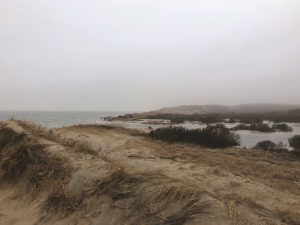WELLFLEET — Mosquitos, the biting, buzzing beasts, are back this year in unprecedented numbers that are terrorizing the Outer Cape. Some ask if the problem could have been avoided, and science does suggest a solution that’s already in the works: restoration of tidal flow in the Herring River.
The origin of the massive swarm is standing seawater behind Duck Harbor Beach in Wellfleet, said entomologist Gabrielle Sakolsky, superintendent of the Cape Cod Mosquito Control Project, a Yarmouth-based quasi-governmental organization charged with managing mosquito populations on the Cape.

The standing water came from winter storms, according to Geoff Sanders, chief of natural resource management and science for the Cape Cod National Seashore. Storm surges flattened the dunes just north of the entrance to Duck Harbor, allowing salt water to flood inland — but not to drain back out.
That brackish water is where the mosquitos are growing. And because the flying bloodsuckers can travel up to 10 miles, residents and tourists all around the Outer Cape are feeling the itch.
With rising sea levels and more intense storms spurred by the climate crisis, Sanders said seawater overwash may become more frequent. And he pointed to the Herring River Restoration Project, an effort to restore tidal flow to the Herring River basin, as a potential long-term fix.
Project Coordinator Carole Ridley said that the restoration will allow greater drainage out of the basin, potentially preventing the stagnant pools that caused the current mosquito outbreak. Ridley also said the project would ameliorate the mosquito problem by allowing larvae-eating fish to return to the basin. But the project is still in the permitting phase, so a solution is unlikely to come soon.
In the meantime, the Mosquito Control Project was aware of a huge population boom beginning in mid-May.
According to Sanders, Mosquito Control first reached out to inform the Seashore of the severity of the problem on May 20. But it wasn’t until June 10 that Sanders, Mosquito Control, and Wellfleet Health Agent Hillary Greenberg-Lemos discussed a treatment plan.
Several weeks later, at the beginning of July, Mosquito Control received special permission from the National Park Service (NPS) to treat the water in the Herring River basin with larvicide.
But at that point, the larvae had already matured, said Sakolsky, and the mosquito boom had become inevitable.
The slow pace of the response is at least partly due to a peculiarity in the relationship between the Seashore and Wellfleet. In other towns, Mosquito Control can go ahead when they detect a problem and treat water inside the Seashore with larvicide, which kills the mosquitos before they can fly and bite. But that can’t happen here.
The Seashore follows rules about mosquito treatment that go back to when the Park was created. Park land in Provincetown and Truro belonged to the state of Massachusetts before being incorporated into the Seashore, and the deeds to the land included provisions to allow for mosquito treatment. But the Park’s properties in Wellfleet have no such provisions.
For that reason, the Seashore had to consult with NPS’s pest management division before granting a permit. The Seashore’s process for approving insecticide treatment, he added, is primarily concerned with whether mosquitos carry disease.
“We can’t just kill something because no one likes it,” Sanders said. “We have certain rules we have to follow.”
Some residents were frustrated with the perceived sluggishness of the Seashore’s response. Corinne Demas of Wellfleet wrote to Seashore Supt. Brian Carlstrom asking that the park be more aggressive with mosquito control.
Seashore officials hope to get there, according to Sanders. “The goal would be to work with our local mosquito control to come up with a solution that will meet our needs here,” he said. Coordination between parks and local mosquito control services is a nationwide issue, he added, saying he expects there will be a national policy for the NPS that will be “adapted locally.”
For now, residents have turned to insecticide treatments instead. Chris Miller, who lives next to the Herring River marsh, said this summer’s mosquitos are the most he’s seen in the nearly 40 years he’s lived here. Last week, he said, he “finally broke down” and had his property sprayed by the Cape Cod Mosquito Squad.
“Our phones are ringing off the hook,” said Curt Felix, owner of the Wellfleet office of Cape Cod Mosquito Squad. The company sprays customers’ yards every few weeks with a solution that is meant to keep the bloodsuckers away. But because of the sheer number of mosquitos, the treatment is not lasting as long, Felix said.
Asked about the environmental implications of private spraying, Sanders said he cannot comment on what people decide to do on their own property, but he said he knows there can be unintended consequences of Park decisions. “We could talk about hindsight all you want,” Sanders said. “But we followed the process we have to follow.”
Mosquito Control’s special permit will allow treatment until December. Sakolsky said she hopes there will be a new arrangement between Mosquito Control and the Park by then.
There are 25 species of mosquitos that are regularly found on Cape Cod, Sakolsky said, the great majority of which are mosquitoes that lay eggs in freshwater. Freshwater mosquitoes are much more likely to carry diseases such as West Nile Virus, though it’s possible for the saltwater variety to infect people as well.
There are no exact counts, but the Mosquito Control Project has traps around the Cape that document the number of mosquitos in an area in a given 24-hour period. Their traps in the Herring River basin, which is where the swarm originated, have routinely amassed 2,000 mosquitos per day since May, according to Sakolsky.
“If we have a trap that gets over 200 mosquitos, I consider that a problem,” Sakolsky said. This, she said, “is historic.”



